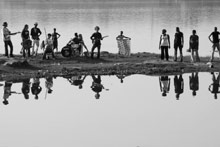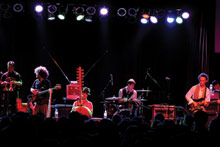Talk to anyone who has seen a Toubab Krewe show and they’ll tell you the same thing: This is a band you have to see live.

Fitting, then, that Toubab would choose The Orange Peel as the setting to record the band’s second album, eight previously unreleased tracks recorded over two nights last New Year’s. It’s an hour of fluid jams, undeniable chemistry and musical exploration that solidifies the group’s reputation as a force to be reckoned with live, and, says guitarist Drew Heller, “the most accurate and real representation of who we are and where we’re at.”
But exactly where the Asheville-based band is at any given moment, notes Heller, is tough to say. Touring almost nonstop nine months out of the year leaves plenty of time for the songs to take on a life of their own. Changes, he says, can be gradual and deliberate or sudden and spontaneous. Either way, no two shows are alike.
“It’s nice to have the songs that we’ve been playing for a long time continually change and have different sections that evolve,” says percussionist Luke Quaranta. “I think that’s something that’s really good for the music.”
“Sometimes,” Heller elaborates, “you find a space in the song that you didn’t realize could form into something else. Other times it feels like the ground gets sucked out from under you and you don’t really know where you are … in a good way.”
That was especially true of the New Year’s performances, he says. Aside from the communal energy and charged atmosphere, the Orange Peel run saw the band expanding on several tracks that had become regulars on tour, which has left a lasting mark.
“That’s what I love about the newest recording,” Heller says. “There’s definitely a lot happening right there, then and there, that I think has forever changed those songs.”

The shows were also an opportunity for Toubab to showcase its musical diversity, sharing the stage with longtime friend and fiddler Rayna Gellert of the all-female Uncle Earl along with influential poet and former member of the Last Poets, Umar Bin Hassan. The quintet met Hassan at a show in Ohio several years ago and have collaborated numerous times since.
Heller says hosting Hassan in Ashville was always a hope, and one particular moment from the show still sticks with him. “We didn’t really rehearse it,” he recalls, “but there was kind of an inspired musical explosion after his poem. It just felt like doors were opening in a cool way. You actually can kind of feel a shared, collective inspiration happening.”
Initially, though, there were no plans to release the Orange Peel recordings. While there had been talk of a live album in the future, the band was already working in the studio, and the tapes were made primarily for Toubab’s own archives. That is, until the band heard them.
“We heard the recording, and it just felt so good, everything about it,” says Quaranta. “Even from the raw files when it wasn’t mixed or mastered, it seemed like all the songs had a great spirit to them. And listening to other versions of the same songs, it felt like something special was going on there.”
“It ended up being kind of effortless in that there wasn’t that much thought given to what the intention of the recording was,” Heller adds. “It was really a nice experience of just hitting play later and being like, ‘Wow! This sounds great!’”
What you’re hearing: A rundown of the Krewe’s instruments
by D.S.
Toubab Krewe incorporates a variety of traditional West African instruments into their lineup:
• Calabash—a hollowed gourd cut in half and played on a pillow or towel; also used by many as a component in several other West African instruments.
• Djembe—a large, skin-covered hand drum, typically goblet shaped, which can be used as a solo instrument or as accompaniment. Widely played throughout West Africa.
• Djembe ensemble drums—traditionally each played by a separate musician with a single stick; contemporary styles feature a single musician with two sticks playing all three drums simultaneously.
• Dunun—largest of the djembe ensemble drums; deep tones are used sparsely to add richness and depth.
• Kamelengoni—a smaller, six-to-12 stringed cousin of the kora; played only in southern Mali, the kamelengoni produces distinctive low tones.
• Karenye—a metal scraper from Mali used for percussion.
• Kenkeni—smallest drum with the highest pitch; used for simple, repetitive lines which lay the foundation of the rhythm.
• Kora—a 21-string harp-lute made from a half calabash gourd covered in cow skin and fitted with a notched neck similar to that of a guitar; the kora’s sound is harplike, though some styles of playing produce tones reminiscent of flamenco-style guitar.
• Krin—a drum made from a single piece of hollowed wood covered with holes of varying size and played with two sticks; the krin was historically used to transmit messages from village to village.
• Sangba – middle-sized drum; typically used for more complex parts.
• Soku – one-string fiddle made from a small gourd and horsehair; played with a horsehair bow to create a raspy tone.
But that doesn’t mean Toubab Krewe isn’t looking forward to working on a proper studio album. They’re already planning time off to write and record, something their heavy touring schedule has prevented in the past.
“We’re looking forward to spending a good chunk of time, a month or two, in the studio,” Quaranta says. “We’ve gone in for five or 10 days, but we haven’t had the opportunity to settle in and have a good, long-term studio experience.”
This time around, that could even include some vocal tracks, though Heller is careful to avoid specifics.
“We collaborate regularly with vocalists in different cities,” he says. “A lot of them have been Malians living in the States or Ivorians living in the States, but we did some vocal tracks with Rayna Gellert up in Vermont last summer. That was really fun. There feels like a lot of looming collaborations with vocalists ahead.”
There has also been talk of a DVD combining live performances with footage of the band’s numerous trips to Guinea, Mali and the Ivory Coast, where they have studied intensively and performed with a who’s who of West African musicians. Already, Toubab has tapped footage of a 2007 trip and compiled a music video for the aptly titled album closer “Buncombe to Badala.”
In the meantime, fans in Buncombe can catch Toubab Krewe at The Orange Peel Nov. 29, where, appropriately, they will celebrate the official release of Live at the Orange Peel.
And while Heller says returning home to share “so much of that inspiration from other nights and other places” is invigorating, it will always be a mixed bag of emotions.
“I have butterflies in my stomach 24 hours before the show’s even started just knowing we’re going to play in Asheville,” he admits. “It’s kind of like that weird thing where sometimes you’re way more nervous if you just play for one or two people. It’s the desire to give it everything you’ve got and do it the best you can kind of feeling.
“And Asheville is also such a nurturing environment for music and creativity. It feels really good to let go there.”
Dane Smith is an Asheville-based freelance writer.
who: Toubab Krewe, with guests Floating Action and DJ Equal
what: Live at the Orange Peel CD release concert
where: The Orange Peel
when: Saturday, Nov. 29. 9 p.m. ($15. www.theorangepeel.net)



Before you comment
The comments section is here to provide a platform for civil dialogue on the issues we face together as a local community. Xpress is committed to offering this platform for all voices, but when the tone of the discussion gets nasty or strays off topic, we believe many people choose not to participate. Xpress editors are determined to moderate comments to ensure a constructive interchange is maintained. All comments judged not to be in keeping with the spirit of civil discourse will be removed and repeat violators will be banned. See here for our terms of service. Thank you for being part of this effort to promote respectful discussion.